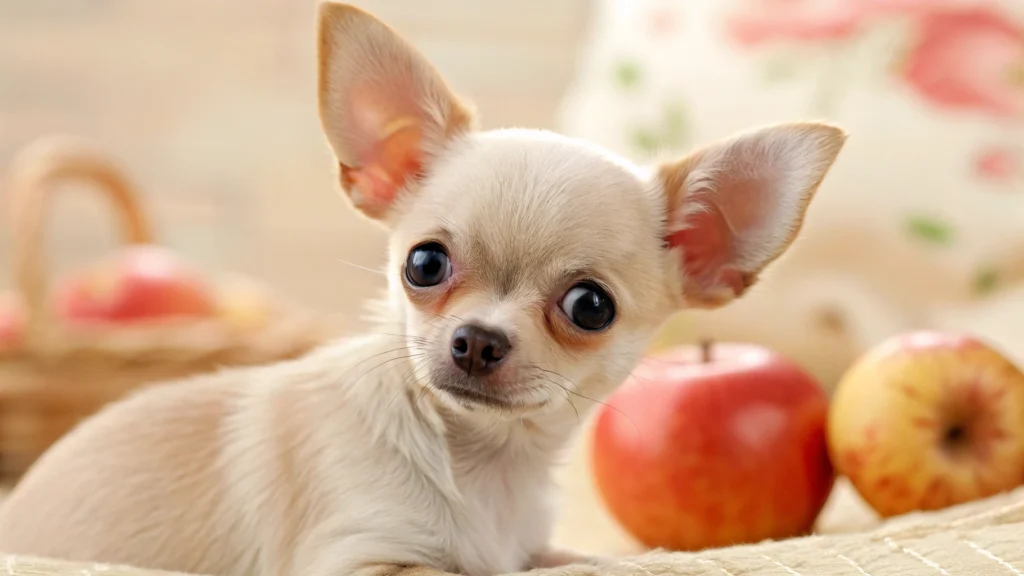
Author: DogsBlogSS Team
⚠️ Disclaimer: This article is for informational purposes only and is not a substitute for consulting a veterinarian.
chug dog
If you’ve ever imagined a pint-sized pooch with the charm of a Pug and the spunk of a Chihuahua, then meet the Chug dog — also affectionately called the “Pughuahua.” These little bundles of energy are an enchanting crossbreed, blending the affectionate, wrinkled nature of a Pug with the confident, alert personality of a Chihuahua. For many dog lovers, Chugs hit the sweet spot: small in size but big on heart, they’re perfect companions for cozy apartments, gentle families, or anyone who wants a loyal sidekick that’s full of personality.
related: Chihuahua puppies: care, training, and health insights
In this article, we’ll walk through everything you need to know about chug dog breed — from what they look like, to their quirks, their health, and how to care for them. You’ll hear advice from experts, learn about their common challenges, and get real-world tips to help you decide if a Chug might be the right furry friend for you.
Breed Overview & Appearance
What is a Chug dog?
A Chug is a designer-mixed breed — the result of crossing a Pug with a Chihuahua. Sometimes they’re playfully called “Pughuahuas” or “Pugwawas.” According to PetMD, because there’s no official breed standard, Chugs can vary widely in appearance and personality.
According to petmd, They’re not officially recognized by major kennel clubs like the AKC, but their popularity has grown significantly in recent years as people look for small, affectionate companion dogs.
How big do Chug dogs get?
Chugs are undeniably small dogs:
- According to petscare, They typically stand around 6–12 inches tall, though some sources stretch that to 14 inches.
- According to The Pug Planet, Adult Chugs usually weigh between 10 and 20 pounds, depending on which parent breed they favor.
According to PetMD, This compact size makes them ideal for people living in smaller spaces such as apartments or condos.
What does a Chug look like?
One of the most delightful things about Chugs is how unpredictable they can be in appearance:
- According to Canine Journal, Their body often reflects the sturdier build of a Pug, but they may have a slightly elongated snout more like a Chihuahua’s.
- According to petscare, Their eyes can be big and expressive. Some inherit the bulging, round Pug eyes; others have a more alert look reminiscent of a Chihuahua.
- According to petscare, Their ears also differ: some are floppy and folded like a Pug’s, while others are erect like a Chihuahua’s.
- According to Canine Journal, Coat-wise, Chugs tend to have short to medium-length fur, and a range of colors is possible — fawn, black, cream, white, or mixed patterns.
Because there’s no standard “breed” for Chugs, every puppy can look a little different — part of what makes them so endearing.
Are Chug dogs hypoallergenic?
According to petscare, Unfortunately, no — Chugs are not hypoallergenic. Both parent breeds shed: Pugs shed quite densely, and Chihuahuas, though small, also lose hair regularly.
So, if you or someone in your household has serious allergies, a Chug may not be the best choice.
Temperament & Personality
Are Chugs good family dogs?
According to petscare, Generally, yes — Chugs make loving, loyal, and affectionate family pets. Many inherit the gentle temperament of the Pug, combined with the confident presence of a Chihuahua.
However, because they’re small and delicate, they are better suited for families that understand their fragility. Young children may accidentally hurt them, so homes with older kids or adults tend to be safer. PetMD emphasizes that Chugs thrive when treated gently and with care.
Do Chugs bark a lot?
According to The Pug Planet, Yes — Chugs can be quite vocal. They often take after the Chihuahua in this regard, with alertness and a “yappy” streak.
As watchdogs, they may bark at strangers, noises, or anything they perceive as out of place. Early socialization and training can help mitigate excessive barking, but if you prefer a quiet dog, this is something to consider.
Are Chugs aggressive?
According to Canine Journal, Not typically. Chugs usually aren’t aggressive by nature, but they can become territorial or feisty, especially if they don’t get proper socialization. Owners sometimes report signs of “small dog syndrome” — behavior in which small dogs act tougher than they really are.
With consistent training, positive reinforcement, and early exposure to different people and environments, Chugs can grow into well-mannered companions.
Do Chugs have separation anxiety?
According to PetMD, Yes — many Chugs are known as “Velcro dogs”, meaning they bond very closely to their owners.
According to Canine Journal, Because of this strong attachment, they are prone to separation anxiety. When left alone for long periods, some Chugs may become anxious or even destructive.
If you plan to leave your dog alone regularly, it’s important to build routines, provide mental stimulation, and possibly consider crate training or doggie daycare.
Are they cuddly?
According to PetMD, Absolutely. Chugs are often extremely cuddly — many love being lap dogs and sleeping right next to their humans.
If you enjoy snuggling with your pet or having a little companion who’s always nearby, you’ll likely appreciate a Chug’s affectionate nature.
Health & Lifespan
What is the life expectancy of a Chug?
According to petscare, Chugs are relatively long-lived for small dogs. Their lifespan commonly ranges from 10 to 16 years, depending on care, genetics, and health.
PetsCare suggests 10 to 16 years. The Pug Planet, for instance, gives a slightly narrower window (10–13 years), likely depending on the lines and health of the parents.
What health problems do Chugs have?
Because Chugs inherit traits from both Pugs and Chihuahuas, they may be prone to a range of health issues:
- According to dogzone, Respiratory issues: If their face is more Pug-like (short and flat), they may suffer from brachycephalic airway syndrome—narrowed nostrils or soft palates can make breathing difficult.
- According to PetMD, Eye problems: Their large, expressive eyes might be more vulnerable to corneal ulcers, dry eye, or other eye injuries.
- According to Pugazon, Joint issues: Small breeds often have patellar luxation, or kneecap dislocation, which Chugs can inherit from either parent.
- According to Canine Journal, Dental disease: Their crowding of teeth (small mouths) can lead to periodontal disease.
- According to Pugazon, Hypoglycemia: Especially in puppies, low blood sugar can be a risk, requiring frequent meals.
- According to PetMD, Obesity: Because Chugs enjoy lounging and eating, they can easily gain weight. Overweight small dogs are at risk for a host of issues including joint strain and pancreatitis.
- According to PetMD, Skin problems: For Chugs that inherit wrinkles like a Pug, skin folds can trap moisture and cause infections — regular cleaning is important.
Do Chugs have breathing problems like Pugs?
According to Pugazon, It depends on their facial structure. If a Chug has a short, flat snout (like a Pug), they’re more likely to struggle with breathing, especially in hot weather or during exercise.
According to Pugazon, On the other hand, Chugs with a more elongated snout (Chihuahua-influenced) often breathe more easily and aren’t subject to the same level of brachycephalic restrictions.
Expert Advice on Health
Veterinarian Teresa Manucy, DVM, in a PetMD article, recommends careful weight monitoring to avoid obesity, which can exacerbate breathing or joint problems.
According to zoetisus, She also advises daily cleaning of facial folds (if present) to avoid skin infections, and regular veterinary check-ups to catch eye issues or dental disease early.
Care, Training, & Exercise
Are Chugs hard to train?
According to petscare, They can be — Chugs combine the smarts of a Pug and the independent streak of a Chihuahua, which sometimes translates into stubbornness.
According to Canine Journal, Still, they’re intelligent and responsive to positive reinforcement. Using praise and treats, especially in short training sessions, works best.
Are Chugs difficult to potty train?
According to petscare,Yes, housebreaking can be a challenge. Their small bladders and occasional stubbornness make training slower than with some larger breeds. Many owners report that patience and consistency are key.
Crate training, establishing a routine, and frequent trips outside (especially as puppies) can help mitigate accidents.
How much exercise does a Chug need?
chugs dog need a moderate amount of exercise — they’re not marathon runners, but they do need daily movement:
- According to The Pug Planet,A 30-minute walk combined with some indoor play usually suffices.
- According to petscare, Avoid strenuous exercise, particularly for flat-faced Chugs, as their breathing may not handle high exertion or heat well.
Can Chugs live in apartments?
According to PetMD, Definitely. Thanks to their small size and modest exercise needs, Chugs make excellent apartment dogs.
They don’t require huge yards, but they do thrive with companionship and mental stimulation — being left alone for long periods can be hard for them emotionally.
Training Tips & Socialization
- According to petscare, Start socialization early: Introduce your Chug to a variety of people, places, and other animals so they learn to be comfortable and less reactive.
- Use positive reinforcement: Short training sessions, treats, and praise work far better than scolding.
- According to Canine Journal, Use a harness rather than a collar: Because of their small build and potential breathing issues, harnesses are safer and more comfortable. Many training experts recommend harnesses made for toy breeds.
- Mental stimulation: Toys, training games, and interaction help prevent boredom, which can lead to barking or destructive behavior.
Cost & Ownership
How much does a Chug puppy cost?
The price for a Chug can vary quite a lot, depending on the breeder, location, parentage, and the breeder’s reputation. According to breeding guides:
- Generally, Chug puppies are priced from around $400 to $800.
- But designer or popular breeders may charge over $1,000 for a puppy with desirable traits or lineage.
Always be cautious and do your homework: ask breeders for health clearances, parent health records, and references.
Where can I find a Chug?
There are a few ways to find a Chug:
- Breeders: Look for responsible breeders who specialize in small crossbreeds and who prioritize health and temperament over profit.
- Rescues & Shelters: Many Chugs end up in shelters or rescue organizations, often listed simply as “Pug mix” or “Chihuahua mix.” These can be wonderful sources — not only are you giving a dog a second chance, but adoption fees are often lower than buying from a breeder.
- Online Adoption Platforms: Websites like Petfinder or Adopt-a-Pet often list Chugs or small-mixed-breed dogs. Make sure to ask about health history, behavior, and age.
Expert Voices & Advice
- Teresa Manucy, DVM, via PetMD, underscores the importance of cleaning facial folds daily for wrinkle-prone Chugs to avoid infections. She also recommends working with a vet on feeding plans and preventing obesity.
- According to Canine Journal, early obedience training and socialization are crucial because Chugs can inherit stubbornness.
- PetsCare highlights that regular vet visits, a balanced diet, and moderate exercise go a long way in ensuring a Chug lives to the upper bounds of their lifespan (10–16 years).
Conclusion
In short, Chugs are tiny dynamos of love. Their compact size, combined with a big personality, makes them endearing to many. But they’re not quite a “low-maintenance” choice — they demand attention, companionship, and thoughtful care. If you’re looking for a dog that will curl up in your lap, follow you around the house, and fill your days with heartwarming quirks, a chug breed dog could be a perfect fit.
That said, it’s vital to approach Chug ownership responsibly. Whether you’re adopting or going through a breeder, make sure health is a priority, training begins early, and the lifestyle you offer matches their emotional needs. With love, patience, and care, your Chug can become a loyal companion for more than a decade.
Notice : The DogsBlogSS editorial team is dedicated to providing accurate, research-based information about dog health, behavior, and care. All our articles are fact-checked using trusted veterinary sources such as VCA Hospitals, Merck Vet Manual, and the AKC.
you may like it








